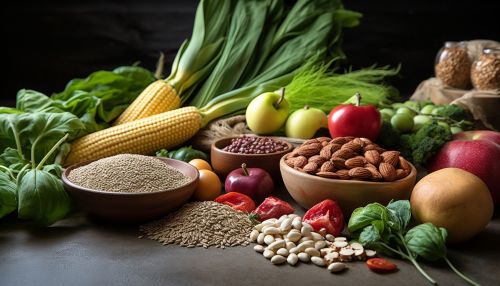Prebiotic (nutrition)
Definition and Overview
Prebiotics are a type of dietary fiber that act as a food source for the beneficial bacteria in your gut. They are non-digestible carbohydrates that are used up by gut bacteria to produce various healthful compounds. Prebiotics are naturally found in many foods, including whole grains, bananas, greens, onions, garlic, soybeans, and artichokes.


Types of Prebiotics
There are several types of prebiotics, including inulin, fructo-oligosaccharides (FOS), galacto-oligosaccharides (GOS), and lactulose. Each type of prebiotic has a unique structure and is utilized by different types of bacteria in the gut.
Inulin
Inulin is a type of prebiotic fiber that is found in many plants, including wheat, onions, bananas, and garlic. It is also used as a food additive to improve texture and taste.
Fructo-oligosaccharides (FOS)
Fructo-oligosaccharides (FOS) are short-chain carbohydrates that are used by beneficial bacteria in the gut. They are found in a variety of fruits and vegetables, including bananas, onions, and garlic.
Galacto-oligosaccharides (GOS)
Galacto-oligosaccharides (GOS) are a type of prebiotic fiber that is found in legumes, lentils, and chickpeas. They are also used as a food additive in certain products.
Lactulose
Lactulose is a synthetic sugar used as a drug to treat constipation and hepatic encephalopathy, a liver disease. It is also a prebiotic, as it feeds the beneficial bacteria in the colon.
Health Benefits of Prebiotics
Prebiotics have been associated with a number of health benefits, including improved gut health, increased calcium absorption, potential anti-cancer properties, and improved blood glucose and lipid levels.
Improved Gut Health
Prebiotics can help improve gut health by promoting the growth of beneficial bacteria in the gut. This can help maintain a healthy gut microbiota, which is important for digestion and overall health.
Increased Calcium Absorption
Some research suggests that prebiotics can help increase calcium absorption, which could potentially improve bone density and overall bone health.
Potential Anti-Cancer Properties
Some studies suggest that prebiotics may have anti-cancer properties. They may help inhibit the growth of harmful bacteria and stimulate the immune system, which could potentially help protect against certain types of cancer.
Improved Blood Glucose and Lipid Levels
Prebiotics may help improve blood glucose and lipid levels. Some research suggests that they may help reduce insulin resistance, which could potentially help manage blood glucose levels. They may also help reduce levels of LDL cholesterol, which could potentially improve heart health.
Potential Side Effects and Risks
While prebiotics are generally considered safe for consumption, they can cause side effects in some individuals. These can include bloating, gas, and abdominal discomfort. These side effects are usually mild and decrease over time as the body adjusts to the increased fiber intake.
In some cases, individuals with certain health conditions, such as irritable bowel syndrome (IBS) or small intestinal bacterial overgrowth (SIBO), may need to limit their intake of prebiotics. It is always recommended to consult with a healthcare provider before starting any new dietary supplement.
Conclusion
Prebiotics are a type of dietary fiber that can promote the growth of beneficial bacteria in the gut. They are found in a variety of foods and can also be taken as a dietary supplement. While they are generally considered safe for consumption, they can cause side effects in some individuals. Always consult with a healthcare provider before starting any new dietary supplement.
